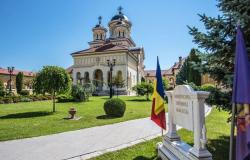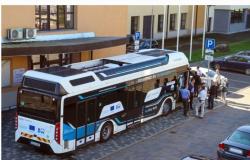Romania has a unique potential on the European level. Sebastian Burduja, the Minister of Energy, made new statements about the bright future of our country in the energy field.
Romania, unique on the European level in the energy field. Sebastian Burduja explains
Sebastian Burduja claims that Romania is an influential presence in the energy field. It is happening by implementing new offshore gas drilling projects, expanding its nuclear capacity and initiating new investments in renewable energy sources. These significant developments are highlighted in a report by fDi Intelligence.
Sebastian Burduja, as Minister of Energy, states in an interview for fDi that Romania’s main objective is to establish itself as a leader in the energy field in South-Eastern Europe. However, he emphasizes the need to address the reality of the “energy trilemma”. Respectively ensuring energy security, maintaining competitive prices and promoting cleaner and more sustainable energy.
In the European Union, Romania stands out for its diversity in the energy field. Our country stands out due to the presence of hydroelectric plants, the development of renewable energy capacity, the management of its own fossil fuel resources, the tradition in the field of nuclear energy and its position as one of the lowest net importers of energy in the EU bloc – reporting only 10.9% in 2021.
The medium and long-term strategy aims to use natural gas and nuclear energy as the main sources of energy production, in support of a significant increase in renewable energy capacity, given its intermittent nature, as well as the development of energy storage capacity.
Romania could become the largest gas producer in the EU
In June 2023, OMV Petrov, the Austrian company, made a final investment decision regarding its projects in the Black Sea, valued at 4 billion euros. Within the Neptun Deep offshore block, OMV is collaborating with Romgaz, Romania’s main gas supplier, to develop two gas fields, with production estimated to reach 140,000 barrels per day starting in 2027. This will strengthen Romania’s position as the largest gas producer in the European Union.
“[Neptun Deep este] a way to help the Republic of Moldova, possibly Ukraine, and other neighboring countries with our gas reserves”, says Burduja.
The energy minister’s perspective is that Hungary, which currently still relies on gas imports from Russia, could explore alternative suppliers in the future, including Romania.
“Before 2027, the goal is to increase gas-intensive industries in Romania, such as pharmaceuticals and fertilizers. We can create value from this gas and not just export it or burn it,” the minister added.
There is also obvious opposition to the plan. Groups of Greenpeace activists from countries such as Romania, Bulgaria and the Czech Republic joined forces in a protest held on March 27, in front of the headquarters of OMV Petrom in the capital. They marked the company building with the distinct message “No New Gas” painted in large yellow letters, thus expressing their disapproval of the Neptun project.
According to the government strategy, gas is seen as a transition fuel in the short and medium term, according to Minister Burduja’s statements. Under this strategy, coal-fired power plants will be gradually closed and replaced by gas-fired ones. An example of this is the construction of a 1700 megawatt gas power plant in Mintia, located in western Romania.
Big plans for Romania and in the field of nuclear energy
Romania’s plans to increase basic energy production are also strengthened by the promotion of nuclear energy. This strategic direction is not new, having its roots in the communist period under the leadership of Nicolae Ceaușescu. During that time, the focus on nuclear power generation was a priority.
“Romania has a long tradition in the nuclear sector, dating back to the 1970s, where we made the strategic decision to rely on Canadian technology called Candu. (…) This was very different from anything anyone else decided behind the Iron Curtain, which was to go to the Soviet Union for technology, fuel and so on,” claims Burduja.
At the moment, the Cernavoda nuclear power plant is successfully operating two reactors. This plant is located almost an hour away from the port of Constanța, located on the Romanian coast of the Black Sea.
In November 2023, Canadian authorities entered into a partnership with local engineering firm AtkinsRéalis and Romania’s state nuclear operator, Nuclearelectrica. The purpose of this agreement is to initiate the modernization works of a Candu reactor at the Cernavodă nuclear power plant.
According to the statements of the Minister of Energy, two more reactors are expected to come into operation by the years 2031 and 2032. In addition, the Minister is excited about the prospects brought by small modular nuclear reactors (SMRs).
His perspective is that Romania has an “extremely ambitious” goal of being among the first countries in the world to have small modular nuclear reactors (SMRs) operational by 2029.
The vision for Romania in the field of renewable energy
Data provided by fDi Markets shows an upward trend in capital invested in Romania’s energy sector. In the previous year, foreign investors in renewable energy committed funds worth $3.1 billion to solar and wind projects in the country, thus reaching the highest level in the last ten years.
This new value brought by renewable sources in Romania is expected to significantly boost energy generation capacity. In addition, the country will inaugurate its first Contract for Difference (CfD) this year, an initiative designed to encourage developers to get involved in building a combined generation capacity of five gigawatts from both wind and solar sources in the next two years.
Through the CfD contract, a stable electricity price will be ensured for the next 15 years. If the price of electricity falls below this level, the government will compensate the difference to the developers, and if the price exceeds the reference price, the developers will reimburse the government for the difference.
Burduja also expresses interest in Romania’s involvement in strengthening European energy supply chains.
“We don’t want to subsidize production from other parts of the globe that don’t follow the same rules of a market economy, the rule of law and so on. (…)
For Europe to pour all this money into the green transition and not have its own supply chain is a huge loss and a huge vulnerability. There are critical components of this energy infrastructure that could be subject to security risks”, claims Burduja on the topic of cyber attacks.
Tags: Romania leader Europe Historic announcement Government
-




